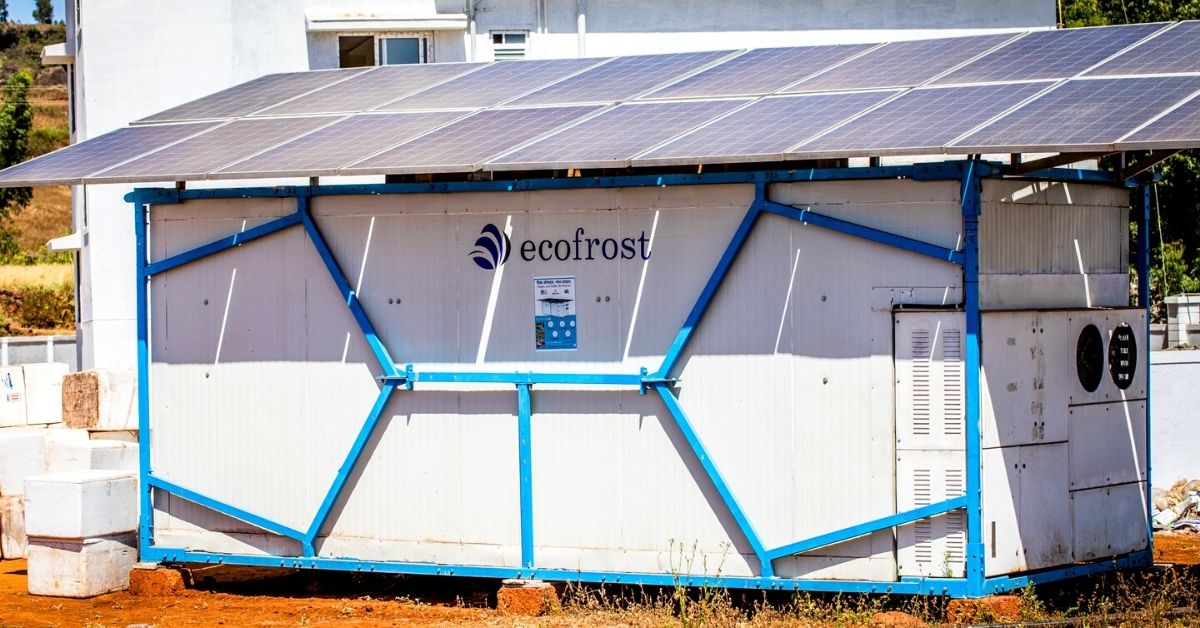In Bihar’s Samastipur, farmers grow lychees and sell them in Pune, Maharashtra, located around 2,000 km away. Achieving this feat would require transporting the fruits via flight, with freight charges soaring upto Rs 25-30 per kilo, which makes it an expensive affair for the buyer.
However, farmers like Sudhanshu Kumar have been able to do so at the rate of Rs 12-15 per kilo. This is possible because he stores the harvest in cold storage and transports it via road, thereby reducing the cost by 30-40%, he says.
“The premium quality fruit remains fresh and ready to be consumed. Without cold storage, it’s not possible to reach a wide market, as fruits have a short shelf life, and will spoil,” he tells The Better India.
Like Sudhanshu, there are thousands of farmers across seven Indian states in India who are benefitting from cold storage facilities launched by a Pune-based startup, Ecozen Solutions. The startup ensures last-mile delivery to customers by retaining the nutrition and freshness of farm produce.
Ecozen Solutions was conceived in 2010 by IIT- Kharagpur alumni Devendra Gupta, Prateek Singhal and Vivek Pandey to offer solar-powered solutions. Initially, the company sold solar solutions such as lanterns, solar rooftops, and residential and LED street lighting, and later moved to offer innovative solar-powered agriculture products such as water pumping solutions.
‘Farmers get control over the market’

Devendra, CEO and co-founder, says the idea of this cold storage was born while he was working with farmers to provide them with irrigation solutions.
“Working closely with marginal farmers with small landholdings helped us realise that while they were benefiting by increasing productivity through innovative irrigation methods, they were unable to improve income,” he says, adding that the yield increased up to 2.5 times. But the per kilo price of sales remained the same.
He says that while trying to identify the reasons for this, the founders realised that the quality of farm produce deteriorated by the time it could reach the market. “The perishability of food became an issue, and we needed a one-point solution to maintain the quality of farm produce,” he adds.
Hence, by 2013-14, they built an Artificial Intelligence (AI) equipped, portable solar-powered standalone cold room – Ecofrost. The facility enables farm level pre-cooling of fruits, vegetables and flowers, allowing farmers to buy time to retain the quality of their produce and get the best possible rates from the market.
“We also started offering cold storage solutions for transporting produce to the market through IoT linkages,” Devendra explains.
Explaining the functionality of Ecozen, Devendra explains that the cold storage facility harnesses solar energy to make ice. The chamber keeps the produce fresh by controlling the humidity, moisture and other parameters, thereby increasing shelf life.
“We use the proprietary temperature heat exchanger mechanism to ensure that the desired temperatures are maintained at all times. When the sunlight is weak or the cooling is not under process, the device can retain optimal environment for up to 30 hours with battery-less backup,” he adds.
The facility can be monitored and controlled via an app.
Devendra says that India wastes about 16% of its food due to a weak supply chain. “These wastages are mainly due to lack of cold storage facilities where farmers fail to store their farm produce. They either sell it at a low price or let it go. We are targeting that segment and trying to reduce the damage and financial losses incurred by the farmers and subsequently Indian economy,” he says.
So far, the startup has set up 250 cold storage facilities, which have helped close to 72,000 farmers, including 40 farmer producer companies in states such as Maharashtra, Telangana, Tamil Nadu, Andhra Pradesh, Jharkhand, Chhattisgarh and Karnataka.
“The effort has helped to reduce losses of over 14,000 metric tonnes of agriculture produce, saved 225 million litres of diesel and abated 6,74,000 tons of Co2,” Devendra claims.
An increase in overall earnings

Manish More, a farmer from Maharashtra, says that using the cold storage facility has benefitted his income immensely. “The pre-cooling facility used in the cold storage helps remove the field heat from the farm produce. On the farm, vegetables, fruits, and flowers absorb heat and start deteriorating. Hence, controlling the field heat within four hours of the harvest becomes important,” he says, adding that this increases the produce’s shelf-life up to 1.5 times.
The farmer adds, “Prices for flowers usually remain at Rs 3-4 per piece, but on occasions such as Valentine’s Day or other festivals, these costs can suddenly shoot up to as high as Rs 20 per piece. Farmers can harvest and store the flowers for a week or more and sell the surplus in the market to increase their income. Such control over the sales is achievable only due to the facility.”
Manish says his total income has improved by 30%.
Farmers either buy the facility, which costs between Rs 5 lakh and Rs 15 lakh, depending on the size, or they lease it. “They buy the facility in groups or clusters by pooling in the money. The usage cost for farmers comes to Rs 1-2 per kilo of farm produce,” Devendra shares.
Speaking about the challenges, Devendra says that when they began, Ecozen was the only company offering this product in the market, so they found it hard to encash the gap. “The market was new, and not many were willing to invest. To overcome this, we decided to focus on the needs of the farmers by helping them market farm produce,” he adds.
Devendra says the company wants to scale up and achieve up to 600 metric tonnes of market linkages to reduce farm losses.
Edited by Divya Sethu
No comments:
Post a Comment